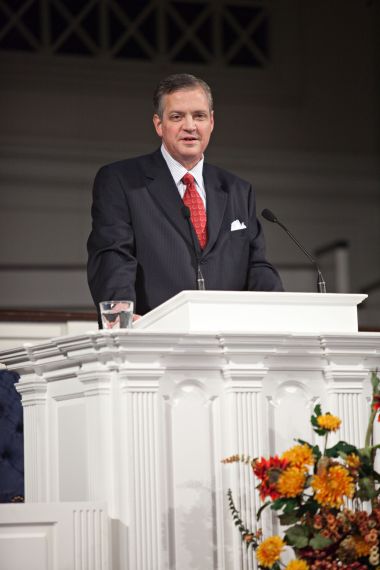Homosexuality: are the 'culture wars' coming to an end?
When a conservative Christian denomination sets up a conference about homosexuality, you know that there are going to be fireworks.

This week the Southern Baptist Convention's Ethics and Religious Liberty Commission hosted a conference entitled, 'The Gospel, Homosexuality and the future of Marriage'. The SBC is the second largest Christian denomination in the US, so has a great deal of influence.
But though it received a lot of criticism, the outcome of the conference seems to be more positive than might have been anticipated. With the subject of sexuality being the main weapon of both sides in the 'culture wars' of liberal vs conservative, at least in the US, the outcome of the conference and the comments from participants might indicate that there could be a lessening of hostility between the two sides.
The SBC is often seen as the voice of conservative Christianity: it "self-consciously seeks to set the tone for conservative evangelical teaching and witness on human sexuality" according to writer and academic Jacob Lupfer. If this is the case, then this side of the 'culture wars' is showing a considerably more conciliatory tone – without changing its theological stance on the subject.
Rachel Held Evans, a prominent blogger and generally a critic of conservative Christianity, tweeted objections to the conference, and retweeted the criticisms of LGBT Christians on twitter.
The ERLC did come under strong criticism from people who argue for total inclusion and equality for the LGBT community. For example, the Association of Welcoming and Affirming Baptists (AWB) tried to campaign against the theological stance of the SBC, for holding that homosexual sex is a sin. In the end, they only achieved half their goal of getting 1000 signatures in support of their views ahead of the conference.
However a number of commentators and attenders noted a significant shift in the attitude of the SBC at the conference. Albert Mohler, president of the Southern Baptist Theological Seminary, publicly repented of his previous denial that homosexual orientation exists. Russell Moore, a senior figure within SBC, stated that ex-gay therapy can be harmful, and spoke against anti-gay bullying.
There were a number of LGBT voices speaking at the conference, though all of them signed up to conservative understanding of the Bible on the issue. One was the UK's Sam Allberry, author of Is God anti-gay?. Another was Rosaria Butterfield, now a pastor's wife, who once identified as a lesbian. Professor Christopher Yuan at the Moody Bible Institute also spoke about his sexuality and celibacy.
The liberal website ThinkProgress found that pastors are not changing their views about whether homosexuality is a sin, but that they are rethinking the way in which they relate to the LGBT community: "They felt torn between what their faith tells them is true and what they hear from LGBT people about the negative way those messages are received," said its report. "Rather than needing reinforcement about what the Scripture tells them, they were focused on learning how to improve their tone to be more loving and respectful, how to truly treat LGBT people as more than just their identities, and how they might reconsider how much to emphasize the sin of homosexuality."
This change of focus was noticed by others. Lupfer wrote on the Religion News Service: "The tone at the conference was more gracious than seen in previous generations. While stopping well short of affirmation, most speakers tried to be as conciliatory as their worldviews allow."
In the UK, this encouragement for understanding is coming from Living Out, a group of pastors who are attracted to their own sex, but take a conservative theological line on the issue.
And while well-known pastors such as Steve Chalke are strongly advocating the full acceptance of same-sex relationships, in a conference he is organising next year he is including a few more conservative voices.
Could it be that both sides are starting to listen to each other more? When any 'side' in a conflict seeks to understand the other, there is always hope that the violence will end.











